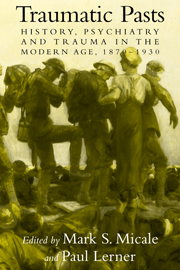Book contents
- Frontmatter
- Contents
- Contributors
- Preface
- 1 Trauma, Psychiatry, and History: A Conceptual and Historiographical Introduction
- Part One Travel and Trauma in the Victorian Era
- Part Two Work, Accidents, and Trauma in the Early Welfare State
- Part Three Theorizing Trauma: Psychiatry and Modernity at the Turn of the Century
- 6 Jean-Martin Charcot and les névroses traumatiques: From Medicine to Culture in French Trauma Theory of the Late Nineteenth Century
- 7 From Traumatic Neurosis to Male Hysteria: The Decline and Fall of Hermann Oppenheim, 1889–1919
- 8 The Construction of Female Sexual Trauma in Turn-of-the-Century American Mental Medicine
- Part Four Shock, Trauma, and Psychiatry in the First World War
- Index
- Titles in the series
7 - From Traumatic Neurosis to Male Hysteria: The Decline and Fall of Hermann Oppenheim, 1889–1919
Published online by Cambridge University Press: 14 October 2009
- Frontmatter
- Contents
- Contributors
- Preface
- 1 Trauma, Psychiatry, and History: A Conceptual and Historiographical Introduction
- Part One Travel and Trauma in the Victorian Era
- Part Two Work, Accidents, and Trauma in the Early Welfare State
- Part Three Theorizing Trauma: Psychiatry and Modernity at the Turn of the Century
- 6 Jean-Martin Charcot and les névroses traumatiques: From Medicine to Culture in French Trauma Theory of the Late Nineteenth Century
- 7 From Traumatic Neurosis to Male Hysteria: The Decline and Fall of Hermann Oppenheim, 1889–1919
- 8 The Construction of Female Sexual Trauma in Turn-of-the-Century American Mental Medicine
- Part Four Shock, Trauma, and Psychiatry in the First World War
- Index
- Titles in the series
Summary
Hysteria has now overflowed all banks, and nothing is safe from it.
Hermann Oppenheim, 1916I feel sorry for Oppenheim, a good, inept man.
Sigmund Freud, 1910In the waning months of the Great War, Tübingen psychiatrist Robert Gaupp was alarmed by the widespread belief that “war is a source of severe nervous or mental illnesses.” This view, he protested, “[is] for God's sake, incorrect.” “Even doctors,” added Gaupp's Berlin colleague Ewald Stier, “frequently succumb to the erroneous assumption that attributes to war a ‘damaging’ effect on the nerves.”
Gaupp and Stier were not unaware of the numerous cases of nervous and mental breakdowns observed during the World War – both were, in fact, actively involved in the diagnosis, treatment, and administration of Germany's nearly 200,000 “war neurotics.” However, like the majority of the nation's neurologists and psychiatrists, they attributed these numbers neither to the intense psychic and nervous demands of prolonged combat nor to the resounding impact of modern weaponry. Rather, both men looked within the psyche, blaming the wishes and fears of those soldiers who, they argued, lacked the strength of will and patriotic conviction to resist fleeing from the unpleasant conditions of war into the “comfortable bed of neurotic symptoms.”
As Stier wrote shortly after the war, “compensation for nervous disorders is not just the most difficult part of pensioning, but is, in short, the central problem of the whole war pension issue. It is impossible to overestimate its significance for the national economy.”
- Type
- Chapter
- Information
- Traumatic PastsHistory, Psychiatry, and Trauma in the Modern Age, 1870–1930, pp. 140 - 171Publisher: Cambridge University PressPrint publication year: 2001
- 12
- Cited by

